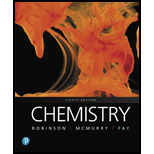
Interpretation:
The three indicated red element and their group should be determined. Whether these elements are catrgorized as metals, nonmetal or semimetals should be determined. Also, whether these elements should be expected to have similar or different properties should be determined.
Concept introduction:
Periodic table represents a systematic arrangement of elements according to their chemical and physical properties. Here, elements are represented as a two-letter symbol and are arranged in increasing order of
Want to see the full answer?
Check out a sample textbook solution
Chapter 2 Solutions
CHEMISTRY-TEXT
- Synthesis of Ibuprofen-Part 2: 1. Some pain relievers including ibuprofen (MotrinⓇ) and naproxen (Aleve®) are "α-arylpropanoic acids." Look up the structure of naproxen (AleveⓇ), another a-arylpropionic acid. Using the same reactions that we used for making ibuprofen, show how to make naproxen from the compound below. Show all intermediates and reagents in your synthesis. Show how you would prepare ibuprofen starting from p-isobutylbenzene rather than p-isobutylacetophenenone. What reaction steps would need to change/add? 3. What signals appeared/disappeared/shifted that indicate that you have your intended product and not starting material? What other impurities are present in your product and how do you know?arrow_forwardAcid Catalyzed Aromatization of Carvone: 1. Starting with the ketone, below, draw a mechanism for the reaction to give the phenol as shown. H2SO4 HO- H₂O 2. Why do we use CDCl instead of CHCl, for acquiring our NMR spectra? 3. Why does it not matter which enantiomer of carvone is used for this reaction? What signals appeared/disappeared/shifted that indicate that you have your intended product and not starting material? What other impurities are present in your product and how do you know?arrow_forwardAssign this H NMRarrow_forward
- Please complete these blanks need that asaparrow_forwardNitration of Methyl Benzoate: 1. Predict the major product for the reaction below AND provide a mechanism. Include ALL resonance structures for the intermediate. C(CH3)3 NO₂* ? 2. Assuming the stoichiometry is 1:1 for the reaction above, what volume of concentrated nitric acid would be required to mononitrate 0.50 grams of the compound above? What product(s) might you expect if you nitrated phenol instead of methyl benzoate? Explain your reasoning. What signals appeared/disappeared/shifted that indicate that you have your intended product and not starting material? What other impurities are present in your product and how do you know?arrow_forwardSodium Borohydride Reduction (continued on the next page): 1. Draw the product of each of the reactions below and give the formula mass to the nearest whole number. ? (1) NaBH (2) acid (1) NaBD4 (2) acid ? 2. In mass spectra, alcohols typically break as shown in equation 8 in chapter 11 (refer to your lab manual). The larger group is generally lost and this gives rise to the base peak in the mass spectrum. For the products of each of the reactions in question # 1, draw the ion corresponding to the base peak for that product and give its mass to charge ratio (m/z). 3. Given the reaction below, calculate how many mg of 1-phenyl-1-butanol that can be produced using 31 mg NaBH4 and an excess of butyrophenone. 4. + NaBH4 OH (after workup with dilute HCI) What signals appeared/disappeared/shifted that indicate that you have your intended product and not starting material? What other impurities are present in your product and how do you know?arrow_forward
- Aspirin from Wintergreen: 1. In isolating the salicylic acid, why is it important to press out as much of the water as possible? Write a step-by-step mechanism for the esterification of salicylic acid with acetic anhydride catalyzed by concentrated H₂SO4. 3. Calculate the exact monoisotopic mass of aspirin showing your work. What signals appeared/disappeared/shifted that indicate that you have your intended product and not starting material? What other impurities are present in your product and how do you know?arrow_forwardSynthesis of Ibuprofen-Part 1: 1. What characteristic absorption band changes would you expect in the IR spectrum on going from p-isobutylacetophenone to 1-(4-isobutylphenyl)-ethanol and then to 1-(4-isobutylphenyl)-1-choroethane as you did in the experiment today? Give approximate wavenumbers associated with each functional group change. Given that the mechanism of the chlorination reaction today involves formation of a benzylic carbocation, explain why the following rearranged product is not formed. محرم محمد 3. Why do we use dilute HCl for the first step of the reaction today and concentrated HCI for the second step? What signals appeared/disappeared/shifted that indicate that you have your intended product and not starting material? What other impurities are present in your product and how do you know?arrow_forwardAssign only the C NMRarrow_forward
 Introductory Chemistry: A FoundationChemistryISBN:9781337399425Author:Steven S. Zumdahl, Donald J. DeCostePublisher:Cengage Learning
Introductory Chemistry: A FoundationChemistryISBN:9781337399425Author:Steven S. Zumdahl, Donald J. DeCostePublisher:Cengage Learning Chemistry for Engineering StudentsChemistryISBN:9781337398909Author:Lawrence S. Brown, Tom HolmePublisher:Cengage Learning
Chemistry for Engineering StudentsChemistryISBN:9781337398909Author:Lawrence S. Brown, Tom HolmePublisher:Cengage Learning World of Chemistry, 3rd editionChemistryISBN:9781133109655Author:Steven S. Zumdahl, Susan L. Zumdahl, Donald J. DeCostePublisher:Brooks / Cole / Cengage Learning
World of Chemistry, 3rd editionChemistryISBN:9781133109655Author:Steven S. Zumdahl, Susan L. Zumdahl, Donald J. DeCostePublisher:Brooks / Cole / Cengage Learning Chemistry for Today: General, Organic, and Bioche...ChemistryISBN:9781305960060Author:Spencer L. Seager, Michael R. Slabaugh, Maren S. HansenPublisher:Cengage Learning
Chemistry for Today: General, Organic, and Bioche...ChemistryISBN:9781305960060Author:Spencer L. Seager, Michael R. Slabaugh, Maren S. HansenPublisher:Cengage Learning General Chemistry - Standalone book (MindTap Cour...ChemistryISBN:9781305580343Author:Steven D. Gammon, Ebbing, Darrell Ebbing, Steven D., Darrell; Gammon, Darrell Ebbing; Steven D. Gammon, Darrell D.; Gammon, Ebbing; Steven D. Gammon; DarrellPublisher:Cengage Learning
General Chemistry - Standalone book (MindTap Cour...ChemistryISBN:9781305580343Author:Steven D. Gammon, Ebbing, Darrell Ebbing, Steven D., Darrell; Gammon, Darrell Ebbing; Steven D. Gammon, Darrell D.; Gammon, Ebbing; Steven D. Gammon; DarrellPublisher:Cengage Learning Living By Chemistry: First Edition TextbookChemistryISBN:9781559539418Author:Angelica StacyPublisher:MAC HIGHER
Living By Chemistry: First Edition TextbookChemistryISBN:9781559539418Author:Angelica StacyPublisher:MAC HIGHER





